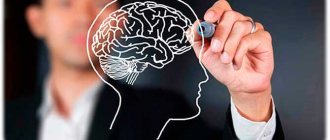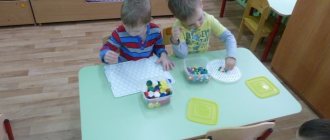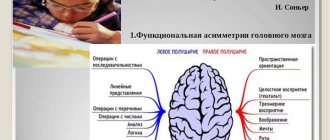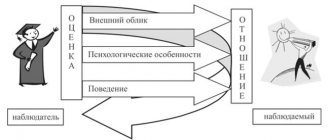Every person living on the planet certainly asks questions about his development at a certain period of his life, but unfortunately, most often the physical aspects of human health and strength come to the fore, but the development of mental capabilities is no less important, and sometimes can play a decisive role in the fate of the individual.
Human brain activity has not been fully studied and definitely consists of many processes that require an individual approach and their own methods of training and stimulation. However, at this stage we will consider such a broad concept as thinking and those effective ways of influencing it, which will lead to the formation of effective thinking in its various forms and directions.
Technologies for the development of thinking
Undoubtedly, to begin to develop, you do not need a lot of financial costs and any equipment as when playing sports, you only need a few free minutes a day (say, 15-30 minutes), consistency and effective use of the allocated time. Undoubtedly, the conditions for the development of thinking do not necessarily require special programs or only the indicated exercises; however, thinking simulators will help you rationally use your time. Their developers implement the latest research in this area for a comprehensive impact on each type of thinking. With this approach, everyone receives an even mental load, without depriving attention of that space of the brain that is rarely used in everyday work.
Types of thinking that need to be systematically developed:
- Boolean
- Abstract
- Creative
- Visually effective
- Visual-figurative
Signs
There are signs by which one can determine that this type of thinking predominates:
- The need to build cause-and-effect relationships;
- Clear systematization of the information received;
- In communication, the use of formulas, calculations, and any conclusions predominates; hypotheses are put forward, and skillful manipulation of words is also noted.
- High ability to summarize and analyze
- The ability to argue your opinion, justifying it logically
If the above signs are not your strong point, do not despair, because it is easy to fix, you just need to be patient, because this is a long process, but very necessary. Because with the help of abstractions and logic, we can find our truth by questioning certain information. Quickly build a chain of certain conclusions and possible solutions to problems. A person becomes able to quickly make a decision and rely on his experience without devaluing or ignoring it. And who doesn’t want to calculate options for events in advance, anticipating them?
Logical thinking
This is perhaps the most popular part of the mental process, which is remembered first and many simulators are offered for its development. The approach to this type should be comprehensive, but it is worth understanding that this systematization does not reflect a complete picture of all the processes inherent in logical thinking. Therefore, let us consider those components of the process under study, on which development work will be carried out in the future.
- Analysis is an understanding of the structure of things, the ability to mentally divide something down to the smallest components and find connections between them. Whether it is the structure of living tissue, the chemical composition of a material, or a chain of events leading to one result, analysis will help to understand the essence of what is happening down to the smallest detail.
- Comparison is the ability to accurately highlight all similar and opposite elements of things, events, concepts. Even unrelated objects can have common features or be completely different, and to correctly classify them, it is necessary to develop this ability.
- Synthesis is the creation of one general structure from its individual parts, sometimes in a different order or combination than it was before. This ability extends to both physical and abstract objects, as well as chains of events that can be interpreted in different ways. Training the ability to synthesize is underestimated and important, it helps to see different connections in seemingly obvious things.
- Abstraction is the use of abstract concepts in the thought process to replace specific images. In this case, a person consciously distracts himself from unimportant details in order to see the whole picture.
Methods for developing logical thinking are quite simple and include a lot of exercises, which are not only collected in simulators, but are also available in a separate version to everyone who wants to develop:
- Reading is an easy way to influence your thinking abilities, and the genre and style of the material is not so important. The reader learns to process the information received, analyze it, draw preliminary conclusions, and correct them in the process of obtaining new information. It is difficult to imagine a developing personality who does not read at all; this is a small but very important step in self-development.
- Logic games are an opportunity to combine a pleasant pastime with a useful activity for the mind. There are many such exercises and they are presented both in digital versions and in physical board games.
- Online simulators are the same exciting classes collected in one place, but they already offer an effective, quick analysis of your actions and are aimed at improving your results.
- Logical chains are a simple activity that is accessible even to children; its essence is to, from a chain of pre-written words, reasonably cross out the unnecessary things that are not connected with the rest.
- Logical connection is a task that asks you to find between, at first glance, completely different words, as many facts as possible that unite them.
- Keeping a diary is a very useful habit that allows you to analyze the events that have passed during the day and express them in writing, give them your assessment and suggest the reasons for this result.
- Sentences with unrelated words - as the name suggests, you need to construct a sentence that is as interesting and attractive as possible with several unrelated words that are thought up and written down in advance. The number of such words can regulate the difficulty level of the exercise.
Forms
In our daily lives, sometimes unconsciously, we use three forms of abstract logical thinking:
- Concept is the ability to characterize an object according to its main features, which must be justified, using one word or phrase. For example, “night”, “cat”, “warm tea”...
- Judgment describes processes in the world, their connections with each other, and methods of interaction. It can deny something, and vice versa, confirm it. It has two types, simple and complex. The difference is that the complex takes on a more narrative character. For example: “Snow has fallen,” and “The water in the pan has boiled, which means you can pour in the porridge.”
- Inference is a very interesting form, indeed a foundation, because, based on one or several judgments, a process of summarization occurs, as a result of which a new judgment is born. It contains premises and conclusions. Example: “Winter has come, snow has fallen and it begins to get dark early.”
Abstract thinking
It is often called verbal or verbal-logical, since it operates with words, and from a huge array of words, a person selects the most significant for a given situation and from them composes a short description in his head. In this process, all additional words and concepts that do not carry a key meaning are not taken into account, but only convey color or an emotional component.
Training verbal thinking is important for everyone, but especially for children who still have a lot to learn, and this ability will take the effectiveness and ease of learning to a new level.
This type, like the previous one, operates on several main components:
- Concept – groups of objects united by the same characteristics. In this case, each of the objects individually is not important, but only the key characteristics inherent in all of them.
- Judgment - can be described as a kind of incomplete conclusion, when a certain thought is affirmed and it is taken into account, but it does not cover the whole picture, but only one aspect.
- An inference is a full-fledged conclusion that is drawn based on all the judgments in a given topic.
Several effective exercises for developing abstract thinking:
- Repeat the sentence in other words - during the task, the meaning and details of the sentence should remain unchanged, but not a single word should be repeated. To achieve maximum efficiency, work on one sentence must be repeated as many times as possible, that is, come up with the maximum number of new phrases that convey the same idea.
- Remove an extra word - from a group of pre-prepared words, one does not fit into the general concept, it needs to be found and removed with reason.
- Find differences between pairs of words - the material is also prepared in advance; words grouped into pairs can be completely different, while during training you need to identify as many differences as possible, some of them are obvious, while others will have to be looked for.
- Words with complex letters - having chosen the least common letters in everyday life, you need to come up with as many words as possible using them.
Kinds
First, let's figure out what types exist and what the difference is between them:
- Concretely effective , or also called practical. It appears in our lives when there is a need to solve specific problems. Can be domestic or industrial. Simply put, this is what we do based on our experience, as well as our ability to understand drawings, designs and other technical details.
- Concretely figurative , or artistic. A distinctive feature is the connection to the present time, from which inspiration is drawn and ideas appear. There is also an emphasis on feelings and emotions; thanks to various experiences, a person becomes able to create.
- Verbal-logical , abstract. Thanks to him, we see the picture of the world as a whole, abstracting from details and concentrating on broad concepts. It is necessary to develop this type, first of all, because it helps us make non-standard decisions, going beyond the boundaries of everyday life and modeling the relationships between real objects and images.
Creative thinking
This is the ability to analyze and process information in a unique way and approach classic problems in a new way. This skill is inherent in every person from the very beginning; you just have to find a way to activate the dormant potential to achieve new results. Not met before. This potential helps not only in creating a new creative product, but also facilitates a person’s practical life, helping to always find a way out of the current situation, even when traditional methods are powerless.
The principles of improvement in this direction are well known and very popular at this time, but this does not mean that many people use them in their practice. All of them are based on the need to regularly meet new people, expand your horizons, and visit new places and activities. Constant, continuous learning on any scale is an essential component of success in this business, and improvisation and the desire for an ideal result will not keep you waiting long for excellent results.
To develop your creative qualities, you should pay attention to a few simple but effective exercises:
- Reproduction of images - to do this, remember several people you met throughout the day, imagine them in as much detail as possible, down to the smallest wrinkle on their face. Now make this image change its mood and facial expressions, smile at you, get angry or upset. To complicate this task, remember the nearest holiday or event where a group of people gathered. Recreate in your memory all the smallest details, including what each of them wore, the music that played, the taste of the treats and the smells in the air. You can also learn to recreate separate groups of images, according to one characteristic, for example, by color - you need to remember as many green vegetables as possible, then yellow, then red, or by taste - sweet, bitter, sour.
- Training your imagination is a favorite game for children, but it can also be a useful exercise for adults. Creating non-existent images in your head allows you to see previously familiar things from a completely different angle. This has a positive effect on the ability to find a way out of any situation and develops creativity in approaching any task. To train creative imagination, you need to imagine an object or concept or sign that is not alive in the real world, is not a person and is quite unambiguous in its essence. Next, in your imagination, you need to endow him with character, habits, good or evil disposition, favorite activities, why he does this or acts this way, imagine what this object would like to do, where he would prefer to live, with whom to be friends. At the very beginning of such exercises, there will be a slight conflict with the logical part of thinking, and this activity will seem stupid and useless to you, but this is an important tool in the development of creative imagination and creativity.
- Fiction stories are an exciting and rewarding activity that can also be fun. To begin with, come up with an incredible situation in a few words, for example: “dinosaurs suddenly came to life” or “snails enslaved the world”, and try to develop the theme as extensively as possible. Address not only the issues of one individual in such a situation, but also how it affected the world globally.
- Imagining a probable future is one of the tools for developing creativity in your personality, because you can imagine your future as plausible as possible, but at the same time the way you want. To make the task more specific, choose an exercise such as a letter to your great-great-grandchildren or a list of things that you would like to pass on to your descendants. You can also come up with a shopping checklist for the zombie apocalypse or the day when robots take over the world. Although such a process seems ridiculous, it helps to connect logic and imagination, and in your thinking everything that happens is reasoned and has a basis.
Recommendations
If you want to increase your level of development, you need to find time for classes lasting an hour and a half at least several times a week. Even with a heavy workload, this is quite possible, the main thing is desire and perseverance. And within a month you will be able to notice how easier it has become to make plans, solve tasks that were not so easy to cope with before, and generally think.
This type of thinking is inherently an acquired skill, an ability. It develops only through mental work, when the brain is busy solving problems, and is not simply an innate ability, the level of which is inherited. So it’s up to you how effectively you can use the gift given by nature.
There are two most basic ways to develop it: theoretical and practical. Theory is mainly taught in higher educational institutions, where they talk about categories, laws and, accordingly, the rules of logic. If you missed these points, it wouldn’t hurt to look for the information yourself. But practice is aimed at translating the resulting theory into reality, consolidating and applying it in order to gain experience. It is ideal when a person uses these two methods in a comprehensive manner. So, directly the most relevant practical methods of development:
1.Games
Yes, having fun playing games helps keep your brain sharp.
- The most popular are chess, checkers and backgammon . Because you have to calculate your steps in advance, anticipating events and possible moves of the enemy. If you don't know how to play, there are many mobile applications that will help you not only learn, but also practice without wasting time in a long line or on the road.
- “Words”, “Cities” ... Who doesn’t know the game where you need to make up others from the letters of a very long word? Or use a single letter to name objects that will fit in a bottle? Educate your children, because they could use not only mental development, but also information, for example, about existing cities.
- Puzzles . A very painstaking process, especially when choosing a complex picture, for example, a landscape. In fact, this method not only helps to develop logic, but also perseverance, patience, and self-control. Fine motor skills in action, attention is focused as much as possible on finding the necessary parts, while the brain “completes” possible options for those already found. If you gather him as a family, this will also be able to bring you closer, because there is no better way to improve relationships than spending time together, especially with pleasure.
- Rubik's cube , even if you cannot solve it by color, with daily practice you can work out possible combinations.
- Poker . Just not for money, but for pleasure, making sure that gambling addiction does not appear. It helps to develop not only logic and calculate possible combinations, but also memory, attentiveness, and also such a useful skill as recognizing emotions through gestures and facial expressions. For those who have read the article about non-verbal manifestations of emotions, poker will be an excellent method for practicing and gaining experience.
2.Learning a foreign language
The sounds of new foreign words force our brain to work, because it is necessary to discover connections and make associations between our native speech and the one we decided to study. With this method, you, as they say, will “kill two birds with one stone” - you will improve your abstract-logical type of thinking and at the same time learn a new language.
- The best option, of course, is to attend courses, but if for some reason this is not possible, do not despair, download online applications to your phone. Learn at least 10 new words every day, and the effect will not be long in coming. I recommend reading the article “Why do you need a plan for self-education and how to make it?”, because in it I included a ready-made plan for self-study of the English language, you will only have to make adjustments if necessary.
- Be sure to practice to consolidate the acquired knowledge and learn correct pronunciation. If you don’t know native speakers of the language you are studying, find communities of people on the Internet who are united by a common goal - sharing knowledge and practice.
3.Reading
We have already talked about its benefits in the article at this link.
- One caveat - you need to read it, analyzing every page, line and phrase. The task is not to read at speed, but to store the necessary knowledge in memory.
- Set up a game for yourself, thinking through different outcomes of events. Allow yourself to fantasize, play Sherlock Holmes.
- Focus on fiction, classics, and scientific literature, from which, among other things, you can also gain knowledge that will certainly be useful in everyday life.
4.Exercises
Modern psychology is constantly coming up with a lot of ways so that you can not only study yourself, but also advance. Take some tests more often that will motivate you to think, and at least a banal test to determine your level of intelligence. I wrote about him in this article.
- Look for some mathematical and logical problems, and take the time to solve them in your spare time. The material can be school textbooks, yours and your children's.
- Solve crosswords, puzzles, sudoku... whatever you like and enjoys.
- An excellent way is to use online services with games to develop memory and thinking. For example this one, here is the link.
Visual-effective thinking
This type of thought process is a product of the left hemisphere and consists of creating a copy of an existing object or object in the mind and identifying its properties and possible benefits, first in one’s imagination for subsequent application in reality. For simplicity, you can imagine a small child who, looking at an object and touching it, imagines where it will fit, whether it is edible or not, whether it can be thrown or hit with it. Adults also use this technique, going over in their heads the possible useful properties of an object, they imagine it in action and make a preliminary conclusion about its suitability for such use. This is clearly expressed when an adult is looking for something to replace a missing part or what to make it from.
This process is trained in all games where various combinations of moves are calculated, for example in chess or checkers, but there are also specially designed exercises:
- Determining the characteristics of an object - choose one of the objects lying in your room and try to imagine its weight. After that, check how it feels by picking it up and determine whether it’s how you imagined it. Also mentally determine its area and try to figure out the relationship with the area of your room. How many of these items will fit in one layer, but what about the volume? If you filled the whole room with such objects, how many would there be?
- Puzzles – both physical and virtual puzzles help develop visual and effective thinking. They force you to first perform actions several steps forward in your imagination, and then check the results in practice.
- A construction set is not only a desirable toy for children, but also a great way to come up with many different shapes and try to assemble them. This is a great workout for your brain, and the more details in the constructor, the better.
- Modeling figures , like a construction set, helps bring to life an object you previously conceived and try to make it exactly the way you imagined it. If you have the desire and time for such an activity, be sure to try it.
What is thinking and why does it need to be developed?
Thinking is the highest human ability to understand this world.
It is contrasted with “low” forms: smell, perception and others, which even primitive species of animals can boast of, but only humans can think logically, analytically, and creatively.
The result of thinking is a thought that you must first extract from the bins of your brain, and then voice it verbally, in writing or in another form.
Of course, all people can think, but the quality of the thoughts they produce is completely different.
Some, as they say, grasp everything on the fly, demonstrate excellent success first in school, then at work, instantly find a way out of difficult situations, while others are very slow to think, so they are always in the shadow of people with developed thinking.
Like, for example, Vanya is a security guard at my former job.
Vanya couldn’t be called an overly stupid or lazy guy, but his thinking was really slow, and putting his thoughts into words was an impossible task for him.
Many people live quietly with slow-wittedness and don’t worry, but our security guard suffered and wanted to change.
How to become smarter? Useful tips!
Vanya and I communicated well, and one day in a conversation he admitted that he would like to develop his thinking.
I promised to help him and picked up a number of tips, which I later finalized into an article to share with my readers.
Visual-figurative thinking
This process helps in solving real-life problems and tasks without involving physical actions, but only with the help of images created from real objects in the head. Unlike creative imagination, objects created in the head actually exist and all that remains is to choose options for using them to solve the problem as effectively as possible.
An important task when training this process is to develop the ability to recreate accurate images of existing objects; several exercises have been selected for this:
- Reproducing a seen object in detail trains attentiveness and allows you to notice and retain more details in your memory in the future. To do this, remember any object or living object and try to describe it for yourself as accurately as possible, how many dots are on it, what color is it, what is the nature of the surface, are there corners and how many of them? The more details you can recreate, the more effectively your spatial thinking will be trained, bringing objects from the real world into your mental space.
- Description of a phenomenon from memory - we are talking about a real-life phenomenon that you witnessed. For example, describe the rain and thunderstorm, what is the smell? What is the temperature of the rain, is it cold or pleasant? And what is the temperature of the surrounding air compared to rain? What did the ground look like during the rain, what is the nature of the soil under your feet? The more details you can recreate, the more effective the training.
- Recent walk - remember your last walk and give as many answers as possible to various questions about its details: where was it? How many of you were there and what were you wearing? What sounds surrounded you and what were you talking about? Did you eat anything and what did it taste like? Such exercises can be developed and similar, they equally well activate the process of creating an image in your memory.
Pathologies of the operational side of the mental process
These violations affect the process of generalizing concepts. Because of this, the logical connections between them in a person’s judgments suffer; direct judgments, ideas about objects and various situations come first. Patients cannot choose from the many signs and properties of an object the most suitable for its most accurate description. Most often, such pathological processes occur in people with mental retardation, epilepsy, and encephalitis.
Violations of this type may also be characterized by a distortion of the generalization process. In this case, the sick person does not take into account the properties of the object, which are significantly related to each other. Only random characteristics are selected; there is no connection between objects and phenomena based on the generally accepted cultural level. This disorder of thinking is observed in schizophrenia and psychopathy.
Human cognitive development
The entire human mental system requires constant development, starting from birth, and even certain genetic data, without development, can lead to degradation and loss. It was in this vein that the concept of cognitive thinking appeared, which literally means aimed at comprehensive development. Thus, by taking action to develop your thinking in different types and areas, you support cognitive development.
The concept of the human cognitive system is characterized by some basic properties, such as efficiency, algorithmicity, digestibility, adaptability and expressiveness. These are the components for constantly developing your thinking and obtaining positive results. According to research, each person, provided there is no damage, is born with approximately similar inclinations for cognitive development and his further success in this matter depends only on classes and exercises.
Diagnostic methods
In order to determine the logic, flexibility, depth, criticality of thinking, how developed its types are, there are many ways to study this mental process. Doctors practice more examination at the organic level; diagnosis of thinking disorders is carried out using generally accepted medical equipment. They look through machines, look for pathological foci, conduct an MRI, an encephalogram, and so on. Psychologists use test materials in their work. Diagnosis of thinking in psychology can also be carried out using planned observation and natural or laboratory experiments. The most common tests for determining the characteristics of mental activity: the “Elimination of Concepts” technique, the Bennett test, the study of rigidity of thinking, and so on. To determine thinking disorders in children, you can use “Divide into groups”, “Trace the outline”, “Find the differences”, “Maze” and others.
Disorders affecting the dynamics of thinking
The diversity of the pace of mental activity, consistency and spontaneity characterize the dynamics of the process, which subjectively reflects reality. There are several signs indicating a violation of the dynamic side of thinking.
- Slipping. With normal and consistent reasoning about something, without losing generalization, patients begin to talk about completely different things. They may slip into another topic without completing the previous one, thinking in inappropriate associations or rhymes. At the same time, taking such reservations as the norm. Because of this process, the normal and logical train of thought is disrupted.
- Responsiveness. The process by which the patient responds to all external stimuli. At first he can reason critically and adequately, but then perceive all absolutely irritants as addressed to him, consider the objects at hand to be animate, which necessarily require help or his participation. Such people may lose orientation in space and time.
- Inconsistency. The sick person is characterized by inconsistent judgments. At the same time, all the basic properties of thinking are preserved. A person may inconsistently express logical judgments, analyze and generalize. This pathology is very common in people with vascular diseases, brain injuries, MDP, and also this disorder of thinking in schizophrenia, but it accounts for about 14% of the total number of diseases.
- Inertia. With the functions and properties of the thought process intact, the pace of actions and judgments is noticeably slower. It is extremely difficult for a person to switch to another action, goal, or act out of habit. Inertia often occurs in people with epilepsy, MDS, epileptoid psychopathy, and can also accompany depressive, apathetic, and asthenic conditions.
- Acceleration. Ideas and judgments that arise too quickly, which even affect the voice (it can become hoarse due to the constant flow of speech). With this pathology, increased emotionality occurs: when a person tells something, he gesticulates too much, gets distracted, picks up and expresses low-quality ideas and associative connections.











